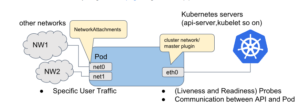
[Infoblog] Open Source in Data Center
As the Software-Defined Data Center (SDDC) model paves the way towards the future of data centers, open-source technologies are at the heart of this technological revolution.

Evolution Of Data Centers
Clubbing of individual components of a Datacenter to form a single node is called a Converged Infrastructure. Clubbing of Software-Defined components to form a node is called Hyper-Converged Infrastructure. The next era is going to be the era of Hybrid Infrastructure where few components will be hardware-based and few will be software-based.

A Primer on Multus-CNI
This blog is for those who are looking forward to getting started with Multus CNI, the blog covers an overview of CNI in Kubernetes, Multus CNI plugin, basic configuration along with a quick deployment scenario.

Medhavi – A Framework for Making Infrastructure Intelligent for HPC workloads
This article is about an open-source platform, Medhavi, to be released in Open Infrastructure Summit 2019 in Shanghai.

Why kubelet runs as a system service in Kubernetes cluster and not as pod/daemonsets?
Why kubelet runs as a system service in K8S cluster and not as pod/daemonsets? Many people have this question in mind when they deploy k8s cluster.

Analysis of Kubernetes and OpenStack Combination for Modern Data Centers
How do Kubernetes and OpenStack integrate and what are the benefits? Sagar Nangare has the answers.
Powering Edge With Kubernetes: A Primer
Adoption of Kubernetes into data centers or cloud has been remarkable since it was released in 2014. As an orchestrator of lightweight application containers, Kubernetes has emerged to handle and schedule diverse IT workloads, from virtualized network functions to AI/ML and GPU hardware resources.

[Infoblog] Kubernetes and Microservices
Kubernetes supports a microservices architecture through the service construct. It allows developers to abstract away the functionality of a set of Pods and expose it to other developers through a well-defined API.
Is the Public Cloud in decline?
When Public Cloud was first introduced, it took the world by storm. The fact that organizations could access resources based on their need and pay only for what they consumed made Public Cloud a great business enabler

